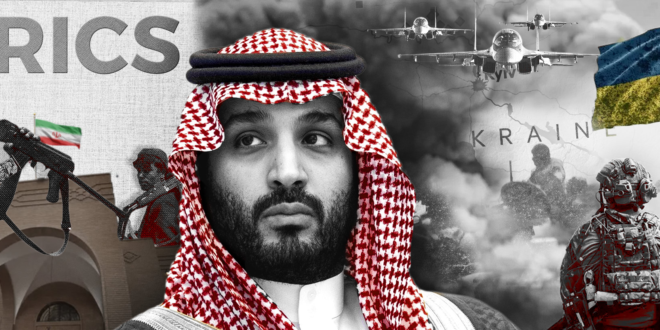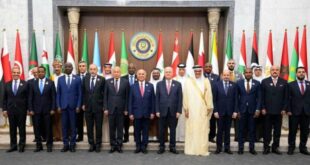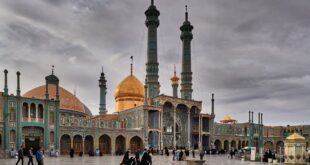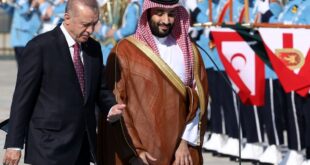Riyadh is redefining its role as a trusted mediator and diplomatic force in the international arena, using its strategic relationships with both east and west to achieve those ambitions.
Last weekend’s gathering in Jeddah of over forty nations marked a significant milestone in Saudi Arabia’s political landscape. The event, ostensibly to advance Ukraine ‘peace talks,’ provided a platform for the kingdom to unveil its diplomatic vision on the global stage and redefine its role in shaping the multipolar world.
For Riyadh, hosting this summit over the contentious issue of the war in Ukraine held profound symbolism. Crown Prince Mohammed bin Salman (MbS), Saudi Arabia’s de facto ruler, has long faced international isolation following the state-sanctioned assassination of Saudi dissident journalist Jamal Khashoggi in 2018.
However, this chapter has now closed: With open arms, the collective west has embarked on a journey of re-establishing political and economic ties with Riyadh.
A New York Times report last week highlighted how the Ukraine discussions in Jeddah have not only placed Saudi Arabia at the big table on a critical global issue, but have also offered MbS “another chance to try to position himself as a world leader with influence far beyond his region and as a mediator who can bring powerful nations to the table, even as he struggles to end his own country’s involvement in a devastating war in Yemen.”
Saudi diplomatic triumphs
This is not the first instance of Saudi Arabia assuming a key role in resolving regional disputes. While the international conference in Jeddah may be the latest in a series of diplomatic feats, Riyadh, in conjunction with Turkiye, had previously undertaken the task of facilitating the exchange of prisoners between Russia and Ukraine. In a display of remarkable diplomacy, Saudi officials played a pivotal role in securing the release of ten prisoners of war held by Russia, marking a significant step towards de-escalation.
President Volodymyr Zelensky of Ukraine, a guest at the summit in Jeddah, passionately implored West Asia’s leaders to stand united against Russia. In a show of solidarity, Saudi Arabia pledged substantial financial assistance to support Kiev’s cause. This echoes the Kingdom’s history of stepping up as a mediator in various regional crises, be it the Lebanese civil war, the Israeli-Arab conflict, or the more recent turmoil in Sudan.
One standout achievement was the 1989 meeting in Taif, organized by Saudi Arabia, which catalyzed an end to the 15-year Lebanese conflict. In 2002, the Kingdom introduced the Arab Peace Initiative, offering Israel a pathway to normalization with Arab states in exchange for a viable Palestinian state, coupled with Israel’s withdrawal from the territories occupied in 1967.
Saudi Arabia’s role in normalizing relations between Ethiopia and Eritrea in 2018 is yet another notch in its diplomatic achievements, fostering harmony between states that had been at odds.
MbS’s vision in redefining diplomacy
The concept of the “inevitability of the renaissance of the Global South” seems to have attracted the attention of MbS. This visionary and fervent young leader, driven by a steadfast belief in the potential for transformative change, has embarked on a path distinct from his predecessors within the House of Saud.
He has taken a bold stance on direct involvement in regional issues, from Yemen to Libya, Lebanon, and Egypt. In turn, he has moved towards a new diplomatic strategy akin to a revolutionary paradigm shift in dealing with foreign affairs.
MbS comprehends the drawbacks of regional conflicts, exemplified by the Yemen war, and the limitations of traditional diplomatic maneuvers when dealing with key regional players such as Iran. This has prompted his dramatic shift away from confrontational tactics or military interventions, and toward a diplomatic strategy characterized by tact and finesse.
A pivotal moment in this trajectory was the Al-Ula summit of Gulf Cooperation Council (GCC) leaders in January 2021, which marked the resumption of fully normalized relations between Saudi Arabia and Qatar—a testament to the power of soft diplomacy.
As the global stage undergoes profound transformation, with the ascent of China and India, Russia’s resolute stance vis-à-vis NATO’s European expansion, the faltering of US influence in the region, and the ascendancy of regional powers such as Turkiye and Iran, the contours of world politics are still evolving.
Saudi Arabia is part of multipolarity
Saudi Arabia has embraced the concept of “emerging multipolarity,” a perspective that envisions a new world order free from western hegemony. This paradigm shift was noticeable when Saudi Arabia hosted the historic China-Arab summit in December 2022, attended by Chinese President Xi Jinping.
More recently, in June during the Arab-China Business Conference in Riyadh, Saudi Investment Minister Khalid al-Falih told CNBC TV:
“We like to believe, and I think it’s been proven, that the kingdom is a significant part of this multipolar world that has emerged. And we’re going to play our part, not only in developing our own economy, but also developing our region, and spreading what we have in terms of development opportunities, also to Africa, Central Asia, the Indian subcontinent.”
Undoubtedly, a pivotal facet of the Jeddah summit on Ukraine lies in the participation of states that have maintained a neutral stance, treating the conflict as a showdown between Russia and the west.
While the Ukrainian narrative resonates in western spaces, Moscow’s perspective on the conflict’s origins and dimensions has managed to permeate the Global South.
The Saudi-led initiative has masterfully rallied other countries – those that have hesitated to align with western endeavors – to bolster support for Ukraine. Notably, China and India, conspicuous by their absence from a previous Ukraine summit in Copenhagen, have now made their presence felt in Jeddah.
Their decision to participate is anchored not only in their desire to nurture positive relations with Saudi Arabia but also in their pragmatic approach to engagement. By “attending and discussing,” these states perceive minimal risk, abstaining from any commitment to President Zelensky’s plan that could antagonize Russia and its President Vladimir Putin.
Saudi synergy with Russia and China
Recalling the instrumental role Beijing played in facilitating Iranian-Saudi reconciliation, it is apparent that there are multiple arenas in which Chinese and Saudi interests align. Foremost among these is their shared apprehension over the potential economic upheaval that unchecked hostilities could create on the fringes of one of their largest markets, Europe.
Riyadh’s strategic vision aligns with other BRICS nations such as India and Brazil, who recognize that their combined influence, as a collective of middle powers, can today leave an indelible mark on the global stage.
The Jeddah summit showcased Riyadh’s ability to mobilize international participation, particularly within the influential G20 framework. This marked shift in approach illustrates Saudi Arabia’s pivot from passively outsourcing its regional security concerns to proactively assuming direct management of its strategic interests.
In some respects, the war in Ukraine was a welcome gift to the Saudis, effectively compelling a visit from US President Joe Biden to mend bilateral ties. Throughout the course of the crisis, MbS deftly maneuvered around Washington’s entreaties to ramp up oil production, resolutely aligning with Russia to maintain oil prices at levels conducive to sustaining Riyadh’s budget and ambitious infrastructure undertakings.
With the dispatch of US National Security Adviser Jake Sullivan to Jeddah, the Biden administration unmistakably conveyed its desire to patch up its differences with the kingdom and act more deferentially toward the Saudis.
While previous peace discussions in Copenhagen yielded modest outcomes, Saudi Arabia is well-placed to sustain the diplomatic momentum necessary for engineering a peaceful resolution to the conflict, while adeptly sidestepping any perception of undue alignment with Russia.
Geopolitical pragmatism
MbS’s strategy is marked by a nuanced approach to US directives, signifying an inclination to stand by them selectively while simultaneously forging robust and strategic collaborations with rival powers. This growing sentiment in Saudi Arabia underscores a perceptible shift away from viewing the west as the sole determinant of global affairs.
In this vein, Saudi Arabia, under the de-facto leadership of MbS, endeavors to enhance ties with both eastern and western powers. The motivation behind this multifaceted diplomacy is rooted in the kingdom’s desire to position itself as an impartial intermediary capable of facilitating constructive dialogues between conflicting sides. Such a role stands to augment Riyadh’s stature on the global stage.
The Saudi leadership adeptly recognizes that the west is inclined towards a pronounced and overt bias in favor of Ukraine in the ongoing conflict. In response, the Saudis are promoting their potential to play the pivotal role of a trustworthy mediator, particularly with Russia.
Riyadh’s shared interests with Moscow – especially in the realm of oil production as OPEC+ members – have catalyzed the cultivation of bilateral relations over recent years. This pragmatic approach reflects the kingdom’s acknowledgment that over-reliance on Washington, particularly in security matters, might not be the wisest course of action.
While the Ukraine war and its many negative repercussions have taken a toll on the psyche of western – especially European – populations, the dialogue around its resolution has expanded to encompass a global perspective.
By offering itself as an impartial intermediary that can bridge east and west, Saudi Arabia is now positioning itself to impact conflict resolution outside of West Asia, prioritizing dialogue, stability, and cooperation – the driving themes of multipolarity.
 Eurasia Press & News
Eurasia Press & News




